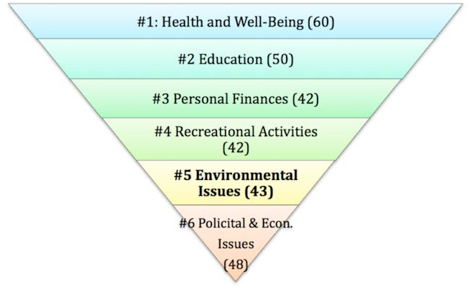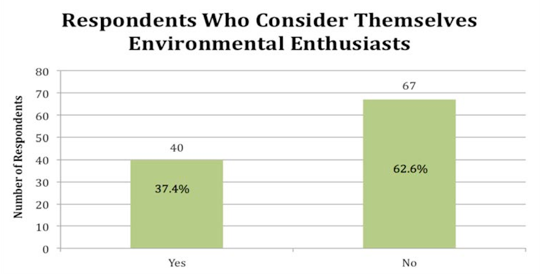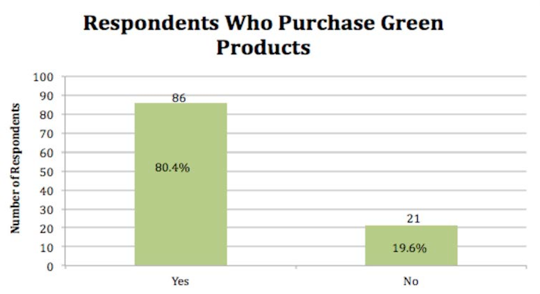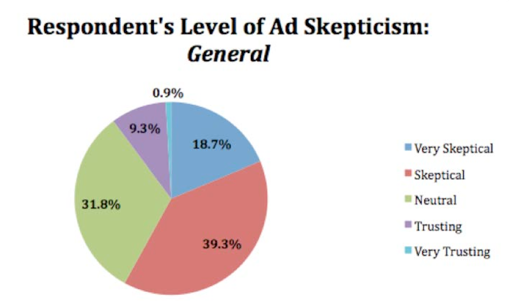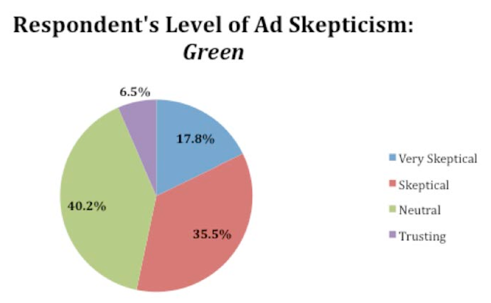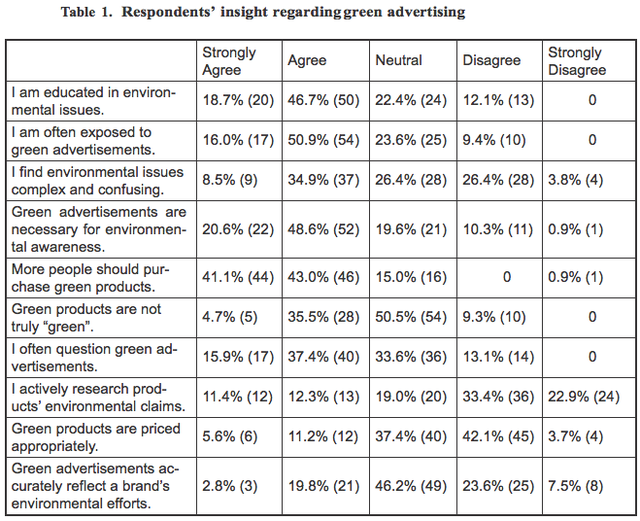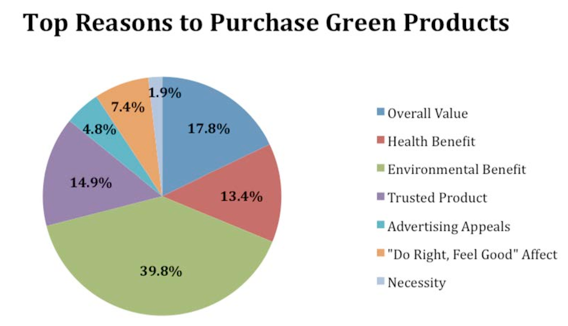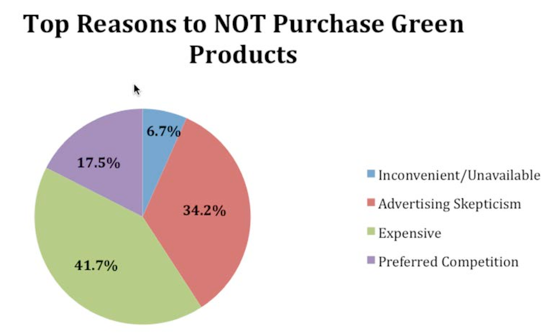From Elon Journal of Undergraduate Research in Communications VOL. 4 NO. 2Examining Green Advertising and Its Impact on Consumer Skepticism and Purchasing PatternsIV. FindingsAmong a total of 107 individuals who completed the online survey, 73 (68.2%) were female, and 34 (31.8%) were male. All were affiliated with Elon University, totaling in 98 (91.6%) student and 9 (8.4%) faculty respondents. Additionally, of the 107 respondents, 22 were indicated as members of various on-campus environmental organizations. They were asked to rank specific items in order of personal importance. The results indicated that the majority of respondents (56.6%) valued their health and well-being as the most important item, followed by education, personal finances, recreational activities, environmental issues and political/economic issues. Figure 1 below illustrates the average respondent rankings and their respective respondent totals. As seen in Figure 1, 43 (40.6%) respondents ranked environmental issues 5th in order of overall personal importance. Figure 1: Ranking of items respondents considered most important.
Respondents were then asked to indicate whether or not they would consider themselves to be an environmental enthusiast. Of the 107 respondents, the majority of the respondents considered themselves not to be environmental enthusiasts (see Figure 2). Participants were then asked to describe in their own words what made a product "green." Responses frequently included the following key words or phrases: sustainable; recyclable; minimal environmental impact; biodegradable; no harmful chemicals; small carbon footprint; low emissions; organic; efficient; minimizes waste; natural; enivronmentally friendly; and renewable resources. Figure 2: Respondents who consider themselves environmental enthusiasts.
Respondents were then asked whether or not they purchased green products as they defined. The majority of the respondents (80.4%) answered positively (see Figure 3). Figure 3: Respondents who purchase green products.
Regarding their level skepticism of advertisements in general, most respondents fell within the neutral–skeptical-very skeptical range, with only 9.3% of respondents indicating trust in advertisements (see Figure 4 on the next page ). Participants were then asked to identify elements that led them to perceive an advertisement as "green." Responses frequently included the following key words or phrases: natural images; accreditation labels; fair trade logos; usda organic; green colors; using low-waste advertising mediums; uses environmental buzz words (green, recyclable, etc); identifies environmental efforts; and personal testimonies After identifying their awareness of green advertising, respondents were then asked to indicate their level of skepticism in regard to green advertising. Results indicated that, similar to advertising in general, the majority of respondents (93.5%) fell within the neutral-skeptical-very skeptical range (refer to Figure 5 for more details). Figure 4: Respondents' skepticism regarding general advertising.
Figure 5: Respondents' skepticism regarding green advertising.
Respondents were then given a set of questions to which they indicated their level of agreement, ranging from "strongly agree" to "strongly disagree." These questions allowed respondents to express their knowledge of and position on green advertising and its appeals. Results can be seen below in Table 1 on the next page. The online survey then asked respondents to list the top three reasons they would be motivated to purchase green products. Of the various responses provided, the top purchasing motivations are illustrated below in Figure 6 on the next page. As seen in the graph, many respondents (39.8%) listed perceived environmental benefits as their primary motivation for purchasing green products.
Figure 6: Key motivators when purchasing green products.
In addition to the top reasons driving respondents' purchases, consumers were also asked to list the top three reasons they would not purchase green products. Results indicated that price and advertising skepticism were the most commonly expressed green purchasing deterrents (See Figure 7). Figure 7: Key deterrents when evaluating green purchases. Suggested Reading from Inquiries Journal
Inquiries Journal provides undergraduate and graduate students around the world a platform for the wide dissemination of academic work over a range of core disciplines. Representing the work of students from hundreds of institutions around the globe, Inquiries Journal's large database of academic articles is completely free. Learn more | Blog | Submit Latest in Environmental Studies |

